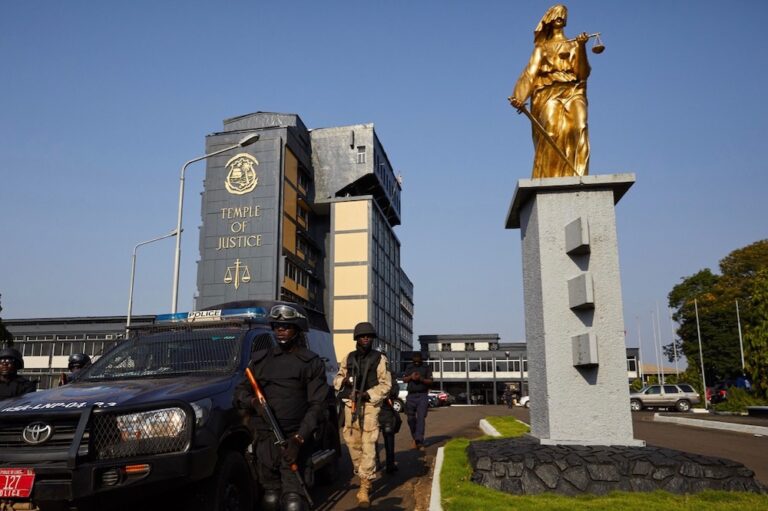Publisher Syrenius Cephus and printing press manager Michael Makinde have been charged with sedition, criminal malevolence and criminal libel against the president.
(CEMESP/IFEX) – The government of Liberia has formally charged the publisher of the “Plain Truth” newspaper, Syrenius Cephus, and the manager of the Seamarco Printing Press, Michael Makinde, with criminal libel against the president, sedition and criminal malevolence.
On the night of 16 December 2009, the two men were served a writ of arrest in the office of Solicitor General Marcus Wright, at the Justice Ministry and were immediately taken to the Monrovia Central Prison pending trial.
Cephus and Makinde are being held in connection with a 9 December publication by the newspaper, entitled “Ellen government supplying Guinean dissident arms? . . . Military junta alleges”.
CEMESP is of the opinion that criminal libel threatens democracy in Liberia and has demanded the immediate release of Cephus and Makinde. In a 17 December statement, the organisation also called upon the government to find other means of seeking redress for whatever wrongs the two men may have committed.
The charges of criminal malevolence, criminal libel and sedition placed on the media workers is a wanton reminder of the harassment and intimidation perennially faced by journalists and media workers in Liberia across various civil and military regimes, with the intention of stifling free and uncensored speech. Such treatment does not represent the democratic credentials upon which the government was elected, and must be stopped forthwith, CEMESP noted.
CEMESP pointed out that libel is a civil offence and that many pro-democracy and human rights practitioners, including stalwarts in the current government like Labor Minister Tiawan Gongloe and Public Works Minister Kofi Woods, stood firmly against criminal libel during the regimes of Samuel Doe and Charles Taylor.
The organisation also noted that students from the University of Liberia led by Alphonso Nimene (now Assistant Minister of Foreign Affairs) were mercilessly flogged by Anti-Terrorist Unit soldiers during the Charles Taylor regime, when they organised a rally to resist similar charges placed against staff of the “News” newspaper in 2001.
The current government’s challenge is to not repeat such charges steeped in human rights abuses in Liberia’s recent past.
Historically, criminal libel has been used as a tool of oppression and to stifle dissent, especially by tyrannical regimes. Its origin as a secret and arbitrary Court of the Star Chamber of England was to serve as a weapon to suppress political dissent and stifle opposition to the English crown, while similar provisions in the Spanish Penal Code were meant to protect the Spanish crown and officials against free speech and actions that tended to question authority.
Instituting this charge anywhere with the inherent threat of imprisonment is an abuse of the justice system and does not hold in any country where authorities want freedom of speech, freedom of expression, and freedom of the press to prevail, CEMESP argued.
The predisposition of public officials to use criminal libel to suppress dissent or opposition is a strong tendency that represents a real threat to free speech and expression.
CEMESP finally challenged the human rights activists within the government, who on other occasions challenged criminal libel cases, to restate their commitment to this tenet of democracy and prevail on their colleagues in the government to reverse this tendency.
Moreover, there is now an international effort led by the West African Journalists Association (WAJA) and the International Federation of Journalists (IFJ) to ensure that libel does not remain a criminal offence.
Any other route would be a betrayal of the Liberian people’s confidence in the democratic process and a deliberate ploy to harass, intimidate and coerce the media into self censorship, as was commonplace during the military regime and the war years.


